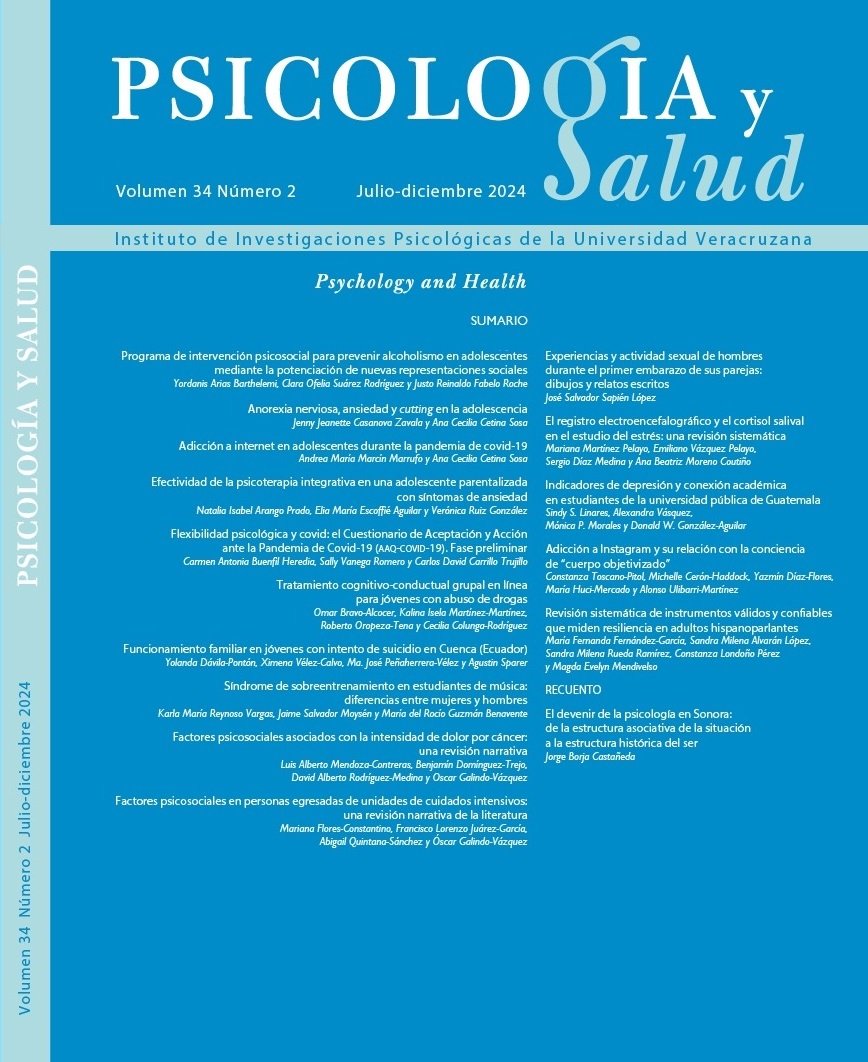Abstract
Anxiety is a problem that has increased in the adolescent population in recent years, primarily due to the Covid-19 pandemic. On the other hand, affective and emotional stability in adolescence stage can be threatened by parental conflicts, which link to the relationship among family members. Frequently roles are reversed, with the children being those who take on the role of parents or caregivers. The present single-case study, sought to implement and evaluate a psychological intervention that allows us to understand how Integrative Therapy works in working on parental conflicts, which, in turn, increase anxiety levels. The psychotherapeutic process included forty sessions along three phases: diagnosis, intervention, and closure. At the end of the intervention, significant progress resulted in anxiety management. Similarly, the patient managed to improve her interpersonal and family relationships since she learned to set limits that, in turn, reduced the conflict with her parents.
References
Boyd Webb, N. (Ed.) (1991). Play therapy with children in crisis. The Guilford Press.
Cáceres P., L.M. (2018). Trastorno de ansiedad por separación y autoconcepto en niños de 8 a 11 años de edad, con padres separados. Santiago de Surco (Perú): Universidad Peruana de Ciencias Aplicadas. Doi: 10.19083/tesis/625171
Cagigal, V. (2010). Orientación parental en las familias con hijos adolescentes. Familia: Revista de Ciencias y Orientación Familiar, 40, 117-130.
Chiliquinga, A. (2015). El juego como herramienta diagnóstica en casos de violencia intrafamiliar con niños y niñas beneficiarios del Taller de Apoyo Escolar del Centro de Desarrollo Comunitario Espejo. Tesis inédita de Bachelor. Quito: Universidad Politécnica Salesiana.
Drewes, A., Bratton, S. y Schaefer, C. (2011). Integrative play therapy. John Wiley & Sons.
Escudero, J.M. (2008). Las competencias profesionales y la formación universitaria: posibilidades y riesgos. Revista de Docencia Universitaria (RedU), 6(2). Recuperado de https://revistas.um.es/redu/article/view/35231
Esquivel, F., Heredia, M. y Lucio, E. (2007). Psicodiagnóstico clínico del niño (3ra ed.). El Manual Moderno.
Fuentes, M. y Palos, P. (2021). Percepción de prácticas parentales y ansiedad en adolescentes mexicanos. Revista de Psicología Clínica con Niños y Adolescentes, 8(1), 54-59.
González, J. (2014). Investigación en psicoanálisis: modelo circular de un solo caso. Aletheia, Revista Anual 33, México IIPCS.
Koppitz, E.M. (1995). El dibujo de la figura humana en los niños. Buenos Aires: Ed. Guadalupe.
Korbman, R. (1963). El juego como método diagnostico en psicología infantil. Tesis de licenciatura. Mérida (Yucatán): UADY.
Oaklander, V. (2008). El tesoro escondido (Hidden treasure): La vida interior de niños y adolescentes. Terapia infanto-juvenil. Cuatro Vientos.
Pedraza, R. (2022). Prácticas parentales y parentalización en adolescentes provenientes de familias monoparentales y biparentales. Tesis de Licenciatura en Psicología. Universidad Nacional Autónoma de México.
Schaefer, C.E. (2012). Fundamentos de terapia de juego. El Manual Moderno.
Valdés, A., Vera, J., Urías M., y Ochoa, J. (2017). Familia y crisis: estrategias de afrontamiento (2ª ed.). Universidad de Sonora.

This work is licensed under a Creative Commons Attribution 4.0 International License.
Copyright (c) 2024 Psychology and Health

